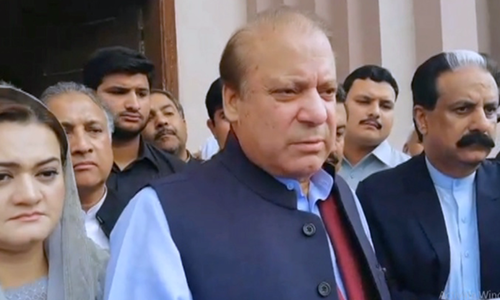A suspect who was arrested for the assassination attempt on Interior Minister Ahsan Iqbal on Sunday evening has a declared affiliation with the Tehreek-i-Labbaik, it emerged late last night.
In a preliminary report sent to the Punjab chief secretary hours after the attack, the Narowal deputy commissioner reported that the suspect had identified himself as Abid Hussain, son of Mohammad Hussain, a resident of Verum village, Tehsil Shakargarh of Narowal district.
"He further showed his affiliation with Tahrik-e-Labbaik [sic]," the DC's letter read.

Abid had allegedly fired at Iqbal from a distance of some 15 yards after the interior minister wrapped up a corner meeting in his constituency in Narowal yesterday evening.
Inspector General of Police (IGP) Arif Nawaz had earlier told Dawn that the 22-year-old suspect, who was arrested from the spot, had confessed to attempting to assassinate the minister over the issue of Khatm-i-Nabuwwat (finality of prophethood).
District Police Officer (DPO) Imran Kishwar had told reporters that the suspect had managed to slip into the gathering carrying a 30-bore weapon, which he later pulled out and fired at the minister.
Thankfully, the people standing around the assailant overpowered him before he could fire a second shot at his target. The policemen present at the site then arrested the suspect, seized his weapon and shifted him to a police station. The motorcycle of the suspect is also in police custody.
"Police are investigating the matter further," the DC's letter to the Punjab chief secretary read.
The Khatm-i-Nabuwwat connection
Late last year, some changes were made to the Khatm-i-Nabuwwat declaration required of prospective lawmakers under new laws drafted by the ruling PML-N in consultation with opposition parties.
The changes eventually became law under the Elections Act 2017, which was steamrolled through parliament amidst loud criticism from opposition parties, which saw it as a means to shoe-horn the then recently-ousted Nawaz Sharif back into power.
The law's passage had triggered protests by various religious parties, spearheaded by the TLP, who saw the modification to the Khatm-i-Nabuwwat declaration as a severe transgression on Muslims' religious sensibilities.
These protests had culminated in a 22-day sit-in at Islamabad's busy Faizabad Interchange in November 2017 which seriously disrupted daily life in the twin cities.
Read: Islamabad High Court declares Faizabad sit-in ‘a terrorist act’
The sit-in had finally ended after top civil-military officials mediated with the protesters following a botched operation, signing off on a number of demands made by TLP.
In the agreement, both the sides had expressed their gratitude to Chief of Army Staff Gen Qamar Bajwa, saying the agreement came about as a result of efforts made by the army chief and his team.
Amidst criticism of the accord reached with the protesters, Interior Minister Iqbal had said that while the agreement that ended the Faizabad sit-in had not been "desirable", the government had been left with little choice in the matter.
"Document of finishing dharna was not desirable but there was little choice because if [the] situation had persisted [for] another 24 hrs there would be riots," Iqbal had said in a tweet at the time.
Following the Faizabad dharna, the PML-N government has repeatedly been branded as a party of apostates and blasphemers by fringe religious groups.
Examine: Rise of Barelvi activism
Several religious edicts have also been issued stating that voting for the PML-N is haram (forbidden under Islamic law).
TLP condemns attack
Meanwhile, Tehreek-i-Labbaik Pakistan (TLP) issued a statement condemning the attack on the minister and attempted to paint it as some sort of pre-election conspiracy.
TLP chief Khadim Hussain Rizvi and Pir Afzal Qadri, in a joint statement, demanded that the government initiate a judicial inquiry into the attack.
The attack on the minister, just months ahead of the 2018 general elections, needs to be probed, they said, adding that TLP is a peaceful religio-political party that believes in change through political struggle and democratic processes.
Minister shifted to ICU after surgeries
Iqbal underwent two consecutive surgeries right after the attack and has since been shifted to the Intensive Care Unit of the Services Hospital in Lahore.
The medical superintendent of the Services Hospital, Dr Ameer, has said Iqbal is in stable condition and the minister will be kept under observation for 24 hours.
Iqbal will be kept under treatment at the hospital till his recovery, the doctor added.
According to the medical superintendent, doctors had decided not to remove the bullet from Iqbal's body as the procedure could create some complications. The bullet had fractured an elbow joint of the minister before burrowing into his abdomen, the doctor said.
On Sunday, the interior minister was rushed to the District Headquarters Hospital after he the assassination attempt. After being administered first aid there, he was airlifted to the Services Hospital in Lahore to undergo surgery.
Punjab government forms JIT
Punjab government on Monday, acting upon Punjab's Inspector General of Police's (IGP) request, formed a joint investigation team (JIT) to probe the assassination attempt on Iqbal.
The five-member JIT has SSP Khalid Bashir Cheema, SP Counter-Terrorism Department Faisal Gulzar Awan and a member each from the Inter-Services Intelligence and Intelligence Bureau.
DIG Investigation Branch Waqas Nazir was appointed the team's convener and granted the power to acquire the services of more officers, if required.
The JIT has begun investigating the case from multiple angles.














































